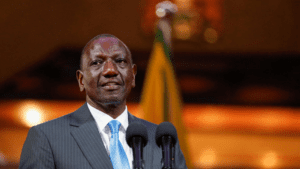
Nancy Macharia, CEO TSC
- Revised Standards for Teaching Registration: New academic criteria for students pursuing teaching careers in Kenya.
- Strict Entry Requirements: Bachelor’s degree in education requires a minimum B- in Mathematics and English, along with a C+ overall mean grade in KCSE.
- Elimination of Bridging Courses: No longer allowed as substitutes for minimum academic qualifications.
- Policy Implementation Timeline: Changes effective from 2025; current student teachers unaffected.
- International Teaching Opportunities: New policies to address teacher unemployment by exporting qualified Kenyan teachers abroad.
- Collaborative Framework: Partnerships with foreign governments to meet global teaching demands.
- Orientation Programs for Teachers: Comprehensive preparation for overseas assignments.
The Teachers Service Commission (TSC) has introduced transformative changes to its registration and qualification policies for teachers, setting a new benchmark for education standards in Kenya. These changes aim to enhance the quality of education, streamline teacher registration processes, and address teacher unemployment both locally and internationally.
New Academic Requirements for Teaching Degrees
Under the updated TSC regulations, aspiring teachers must meet stricter academic requirements to enroll in education programs. The revised criteria for pursuing a Bachelor’s degree in education at any university include:
- A minimum grade of B- in Mathematics and English.
- An overall mean grade of C+ in the Kenya Certificate of Secondary Education (KCSE).
- A grade of at least C+ in each teaching subject.
Previously, students were only required to achieve a C+ overall mean grade and a C+ in their teaching subjects to qualify. The heightened standards are designed to ensure that future educators possess strong foundational knowledge and are better equipped to deliver quality education.
Elimination of Bridging Courses
In a significant policy shift, TSC has abolished the use of bridging courses as a way to compensate for students who fail to meet the minimum academic qualifications. This move underscores the Commission’s commitment to maintaining high standards in teacher preparation. Aspiring teachers will now need to meet the stipulated academic thresholds without exceptions.
Requirements for Diploma in Secondary Education
For students pursuing a diploma in secondary education, the new qualifications are slightly less stringent but still uphold rigorous standards. Candidates must achieve:
- A minimum grade of D+ in Mathematics.
- A grade of C in English.
- An overall mean grade of C+ in KCSE.
Impact on Current and Future Students
The revised policies, which take effect from 2025, will not affect students currently enrolled in teaching programs. However, all colleges and universities offering education courses must comply with the new regulations starting next year. This transitional approach allows institutions sufficient time to adapt to the changes and ensure adherence to the updated standards.
Addressing Teacher Unemployment Through Global Opportunities
One of the key motivations behind the policy revision is to address the growing unemployment crisis among teachers in Kenya. With an estimated 354,234 qualified teachers currently jobless, the government, through TSC, has developed a strategic plan to create international employment opportunities. These efforts aim to position Kenyan educators as global assets, meeting the rising demand for qualified teachers worldwide.

Exporting Kenyan Teachers Abroad
Starting next year, TSC will facilitate the deployment of unemployed Kenyan teachers to 17 countries through structured government-to-government agreements. According to TSC CEO Dr. Nancy Macharia, this initiative seeks to capitalize on the global demand for Kenyan educators, particularly those specializing in English, Kiswahili, and other niche teaching areas.
Countries Requesting Kenyan Teachers
Several nations have expressed interest in recruiting Kenyan teachers, including:
- English Teachers: United States, Ireland, Germany, Canada, Vietnam, South Korea, Spain, and France.
- Kiswahili Teachers: South Africa, China, Botswana, and Japan.
- Special Education Teachers: Qatar, Kuwait, and the United Arab Emirates.
- Islamic Religious Education and Science Teachers: Qatar.
Dr. Macharia emphasized that Kenyan teachers are highly regarded internationally due to their professionalism and expertise, particularly in teaching English and Kiswahili. This demand has created opportunities for Kenyan educators to thrive in global job markets.
Policy Framework for Teacher Export
To ensure the success of the teacher export program, TSC has developed a comprehensive policy framework that outlines the selection criteria, qualifications, and guidelines for deployment. Key aspects of the framework include:
- Eligibility Criteria: Applicants must be Kenyan citizens, registered with TSC, and possess a degree, diploma, or certificate in education from an accredited institution. They must also meet the constitutional requirements under Chapter Six and fulfill any additional qualifications set by the host countries.
- Host Country Requirements: Depending on the destination, teachers may need to demonstrate language proficiency, undergo specialized training, or obtain professional certifications specific to their roles.
- Orientation Program: Selected teachers will participate in a preparatory program covering critical aspects such as:
- Security and health care
- Transportation logistics
- Terms of engagement and compensation
- Cultural sensitivity and language proficiency
- Educational practices unique to the host nation
- Career counseling and professional development
Collaborative Approach to Teacher Deployment
The teacher export initiative is a collaborative effort involving multiple government agencies. TSC will work closely with the Ministries of Labor and Foreign Affairs to explore and secure international teaching opportunities. These partnerships are designed to streamline the recruitment process and ensure that Kenyan teachers are well-prepared for their assignments abroad.
Application Process for International Opportunities
Once the program is officially launched, TSC will release detailed guidelines and an online application portal for unemployed teachers. This streamlined process aims to make it easier for qualified educators to apply for overseas teaching positions while ensuring transparency and fairness in candidate selection.
Long-Term Benefits of the Policy Changes
The revised registration policies and international employment opportunities are expected to yield several long-term benefits, including:
- Improved Quality of Education: By raising academic standards, the new policies will produce highly qualified teachers capable of delivering exceptional education to students.
- Reduced Teacher Unemployment: The international deployment program will create job opportunities for thousands of Kenyan educators, alleviating the unemployment crisis.
- Strengthened Global Reputation: The export of skilled Kenyan teachers will enhance the country’s reputation as a hub for quality education and professional expertise.
- Economic Growth: Remittances from teachers working abroad will contribute to Kenya’s economy, providing a stable source of income for families and communities.
- Cultural Exchange: Kenyan teachers will have the opportunity to share their knowledge and experiences while learning from diverse cultures, fostering global understanding and collaboration.
The Teachers Service Commission’s revised policies mark a significant milestone in Kenya’s education sector. By enforcing higher academic standards and facilitating international employment opportunities, TSC is not only enhancing the quality of education but also addressing critical issues such as teacher unemployment. These changes position Kenyan educators as valuable contributors to the global teaching community, paving the way for a brighter future for both teachers and students.


